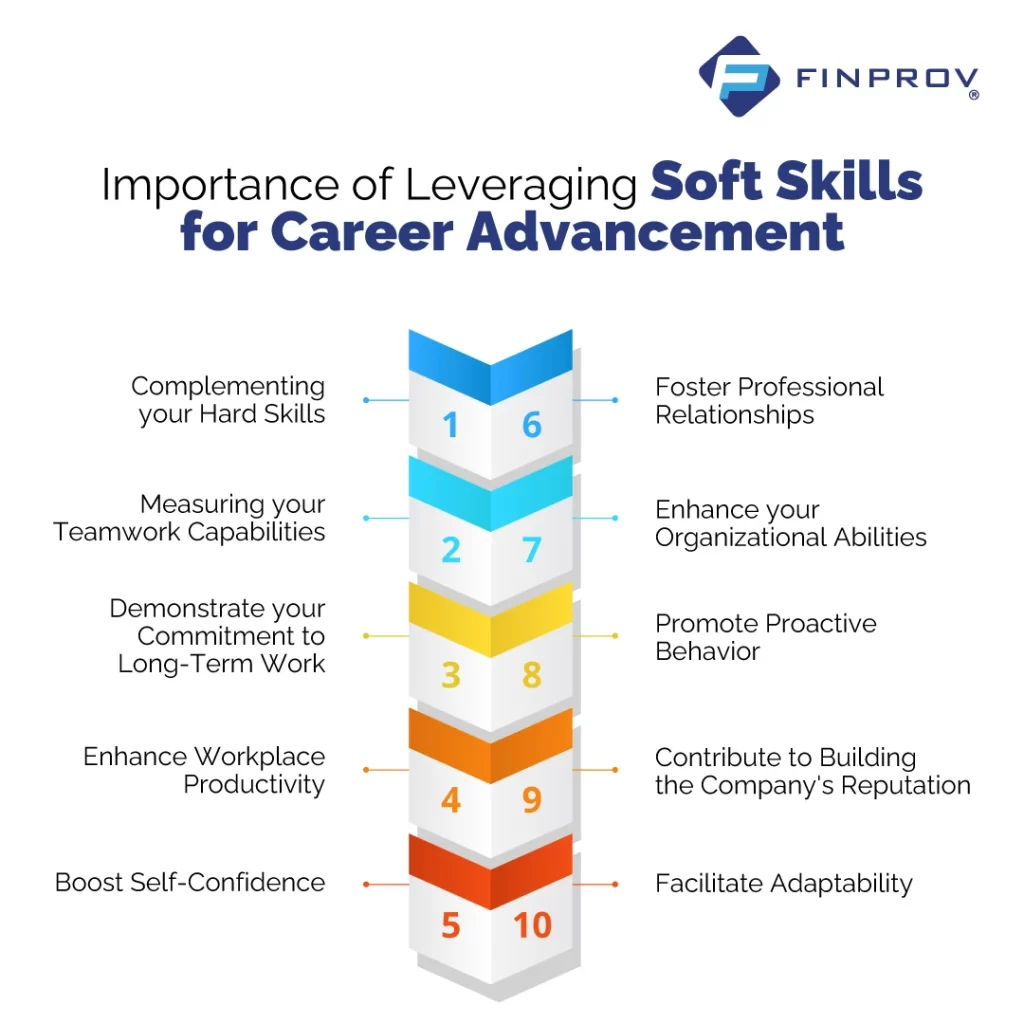In today’s competitive job market, it’s crucial to acknowledge that achieving career excellence extends beyond hard skills alone. While hard skills are associated with specific technical knowledge and expertise, soft skills are personality traits that facilitate building relationships and solving workplace problems. Moreover, soft skills enable you to leverage your hard skills to their full potential. While hard skills can be objectively measured, soft skills demonstrate your ability to collaborate with others and adapt and grow within a company. As a result, almost every job role today demands candidates to possess excellent soft skills alongside their technical proficiency.
Importance of Soft Skills in Career Development
Employers consistently seek candidates with demonstrated soft skills, making it crucial to highlight them in your job applications. Soft skills encompass the habits and traits that shape how you collaborate with others and function independently. These skills are pivotal in achieving success in the workplace and excelling in your job role. Here are several reasons why leveraging your soft skills is vital when seeking a suitable job and advancing your career:

Complementing your Hard Skills
More than relying on technical expertise is required to secure a job or a thriving career. Employers evaluate your application based on your hard skills and how effectively you utilize your soft skills to enhance your technical proficiency. For instance, a business development associate with unparalleled knowledge of their market and product will need solid communication skills to secure business deals. Hence, it is imperative to leverage your soft skills to add value to your complex or technical skills.
To make your CV stand out, list all relevant soft skills that complement your hard skills. For example, when applying for a managerial role, emphasise soft skills such as creativity, active listening, leadership, and communication in the skills section of your CV.
Measuring your Teamwork Capabilities
Regardless of the job role, you will inevitably collaborate with others as a team. Working effectively with clients, colleagues, and team members is crucial for accomplishing tasks efficiently. Employers actively seek employees who can seamlessly integrate into the team’s dynamics. Consequently, they assess your soft skills to gauge your teamwork and communication abilities. To demonstrate that you are a team player, consider including soft skills such as active listening, adaptability, and flexibility on your CV.
Demonstrate your Commitment to Long-Term Work
Employers have a preference for candidates who express a desire to work with them for an extended period. When employees exhibit a genuine interest in long-term employment, it reflects in their attitude and responses during interviews. Soft skills such as commitment and motivation indicate your intention to remain with a single employer for years. Employers often consider longevity a deciding factor when choosing between candidates with similar qualifications and experience.
Enhance Workplace Productivity
Many soft skills contribute to improving performance and productivity in the workplace. For example, excellent time management and communication skills enable effective time allocation and clear articulation of ideas to team members. This ensures the timely completion of work without compromising quality. When hiring for a specific position, employers value candidates who possess a range of soft skills as they contribute to achieving common business goals.
Boost Self-Confidence
A notable benefit of soft skills is their ability to enhance self-confidence. With confidence, you can easily navigate workplace challenges and conflicts. Additionally, your spirit can inspire and uplift the morale of other team members. Employers seek candidates who can confidently present their ideas, necessitating excellent communication skills. By utilising appropriate soft skills, you can develop confidence in your abilities and become an integral part of any team.
Foster Professional Relationships
Soft skills are instrumental in building relationships with team members, clients, stakeholders, and business partners. Communication skills, for instance, positively influence how you interact with others. Empathy is another valuable soft skill that aids in establishing and maintaining workplace relationships. Employers value candidates who demonstrate empathy towards their peers, understand their perspectives, and respect their opinions. You strengthen your professional connections by displaying empathy, care, and respect for others.
Enhance your Organizational Abilities
Staying organised in the workplace is greatly influenced by soft skills like time management, goal setting, delegation, and attention to detail. These skills play a vital role in maintaining efficiency and productivity in professional settings. Companies value employees classified as dependable and capable of completing tasks on time without compromising quality.
Organisational skills and soft skills like critical thinking enable you to solve workplace problems, collaborate with team members, and plan projects effectively. You can demonstrate your organisational skills to employers by arriving on time for interviews and presenting a well-structured CV.
Promote Proactive Behaviour
Employees who take the initiative enhance their performance and inspire others to elevate their work standards. Possessing soft skills like a positive attitude and problem-solving capabilities encourages you to take on new projects and actively address workplace challenges. Additionally, soft skills empower you to pursue your ideas and translate your thoughts into action. During interviews, emphasise your ability to motivate others and independently analyse issues to initiate solutions.
Contribute to Building the Company’s Reputation
Soft skills are crucial in shaping your reputation and contributing to your employer’s reputation. How you interact with clients and stakeholders influences how they perceive your company. Employees who demonstrate excellent work ethics, meet deadlines, handle conflicts diplomatically, and approach projects with an open mind contribute to establishing a positive reputation for their company.
Facilitate Adaptability
Employers expect you to find alternative solutions when things deviate from the desired path. For instance, technological changes can impact final deliverables. An employer would prefer to hire a candidate willing to learn the new technology without hesitation. Soft skills like adaptability enable you to navigate industry shifts and support team members during change.
Finprov provides skill development courses to enhance candidates’ expertise and improve their chances of success. We are committed to supporting job seekers’ professional growth and equipping them with the skills necessary to excel in their careers. By joining Finprov, you can access various skill-building opportunities in the accounting industry.





